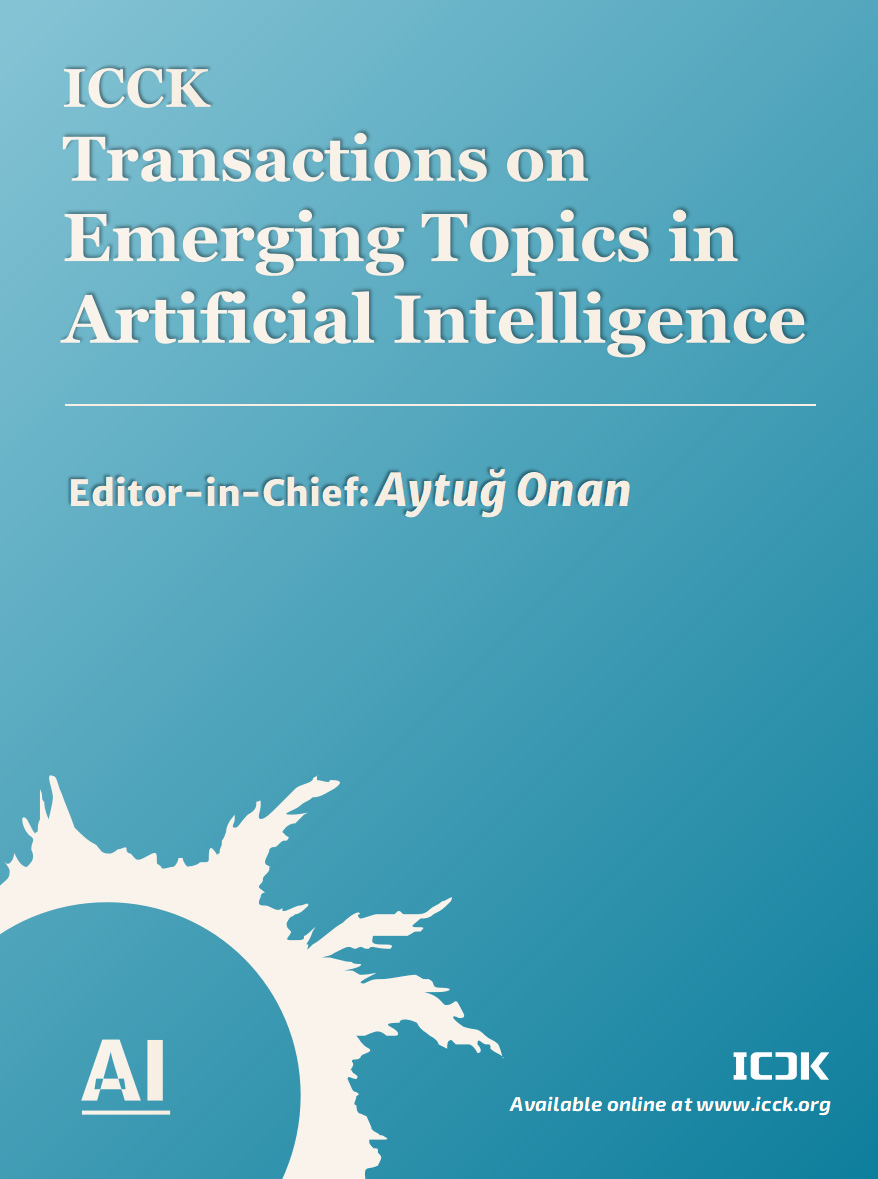About the Journal
| Journal | ICCK Transactions on Emerging Topics in Artificial Intelligence |
|---|---|
| ISSN | 3068-6652 |
| Abbreviation | ICCK Trans. Emerg. Top. Artif. Intell. |
| CODEN | TETAI |
| Publishing Model | Open Access |
| DOI Prefix | 10.62762/TETAI |
| Official Website | https://www.icck.org/tetai |
| Former Title | IECE Transactions on Emerging Topics in Artificial Intelligence (Before Volume 2, Issue 2) |
Aims & Scope
Aims
The ICCK Transactions on Emerging Topics in Artificial Intelligence (TETAI) is a peer-reviewed international journal that aims to provide a high-quality platform for the dissemination of innovative research in artificial intelligence. The journal focuses on emerging theories, algorithms, and applications that address the evolving challenges of intelligent systems in diverse domains. TETAI seeks to promote interdisciplinary collaboration among researchers, engineers, and practitioners, while fostering the development of interpretable, scalable, and efficient AI solutions. By encouraging both theoretical advancements and practical implementations, the journal contributes to shaping the future of intelligent and autonomous technologies.
Scope
The scope of the Journal includes, but is not limited to:
- Foundations and Theories of Artificial Intelligence
- Explainable and Interpretable AI
- Generative AI and Creativity-Augmenting Systems
- Edge, Embedded, and Cloud-based AI Architectures
- AI in Federated, Distributed, and Privacy-Preserving Learning
- Self-Supervised, Semi-Supervised, and Transfer Learning
- Deep Learning and Lightweight AI Models
- Multimodal and Graph-based Learning Frameworks
- Time Series Analysis and Forecasting with AI
- Anomaly Detection and Risk Prediction Systems
- AI for Medical, Healthcare, and Bioinformatics Applications
- NLP and AI for Public Health, Surveillance, and Social Intelligence
- AI for Financial Technologies and Economic Risk Analysis
- Computer Vision, Object Detection, and Video Understanding
- Intelligent Autonomous Driving and Smart Transportation Systems
- AI in Renewable Energy Forecasting and Sustainability
- Emerging Applications of AI Across Science, Engineering, and Society
Publication Frequency
Quarterly
Ownership
The journal is owned by Institute of Central Computation and Knowledge Inc.
Author Fees
For information regarding publication fees and waiver policies, please refer to Article Processing Charge (APC).
Archiving
All journals published by ICCK are archived in Portico, which provides permanent digital archiving for scholarly journals.
Copyright & Licensing
Articles published in TETAI will be Open-Access articles distributed under the terms and conditions of the Creative Commons Attribution 4.0 International (CC BY). Under this license, author(s) retain ownership of the copyright for their article, but authors allow anyone to download, reuse, reprint, distribute, and/or copy articles published in TETAI, so long as the original author(s) and source are cited.
Access Policy
All articles published in this journal are freely available to readers worldwide immediately upon publication. There are no subscription charges or pay-per-view fees. Readers may read, download, copy, distribute, print, search, or link to the full texts of the articles, or use them for any other lawful purpose, without asking prior permission from the publisher or the author.
Editorial Board
The Journal is guided by an Editorial Board consisting of recognized experts in the field. For the complete list of Editorial Board members, please refer to Editorial Board.
Peer Review
The journal adheres to rigorous peer review and undergoes single-blind peer review. For more details, please refer to Editorial Process and Peer Review Policy.
Editorial Process
All manuscripts submitted to TETAI should adhere to the journal's Editorial Process.
Plagiarism
Plagiarism detection is performed at ICCK using the iThenticate- Crossref Similarity Checking tool. This web-based tool is employed in the editorial process to identify potential text plagiarism. It's important to note that while iThenticate can identify matching text, it cannot independently determine whether plagiarism has occurred. Manual examination of the matching text is still necessary, and judgment must be exercised to ascertain the presence or absence of plagiarism. The similarity report might be sent to the author for revision whenever needed.
Publication Ethics Statement
ICCK is responsible for implementing rigorous peer review and strict ethical policies and standards to ensure that high quality scientific work is added to the field of scholarly publishing. ICCK takes such publishing ethics issues very seriously, and our editors are trained to enforce COPE's Core Practices and Guidelines, with a zero-tolerance policy for plagiarism, data falsification, and other behaviours. To verify the originality of content submitted to our journals, we use iThenticate/Crossref Similarity Check to check submissions against previous publications.
Advertising
The journal does not accept any commercial product advertisements until policy changes otherwise.
Direct Marketing
Journal propagation has been done through the journal website and distribution of an introduction pamphlet. Invitations to submit a manuscript are usually targeted towards presenters at conferences, seminars, or workshops related to the journal's aims and scope.
Contact
Please visit Editorial Office for details about different queries.

